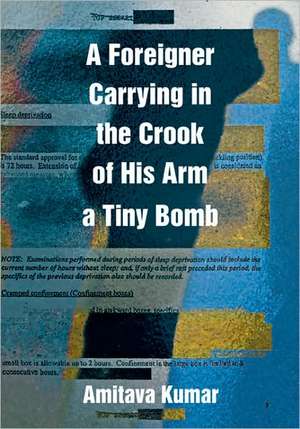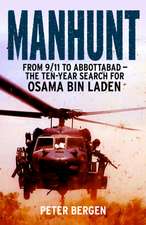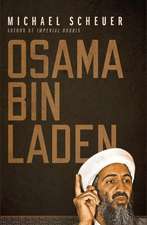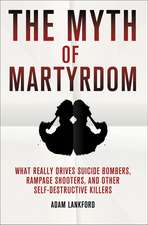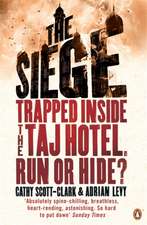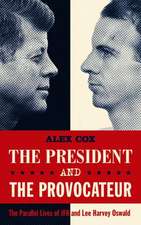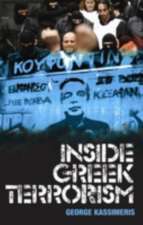A Foreigner Carrying in the Crook of His Arm a Tiny Bomb
Autor Amitava Kumaren Limba Engleză Paperback – 9 iun 2010
Preț: 237.85 lei
Nou
Puncte Express: 357
Preț estimativ în valută:
45.52€ • 47.40$ • 38.47£
45.52€ • 47.40$ • 38.47£
Carte tipărită la comandă
Livrare economică 08-22 martie
Preluare comenzi: 021 569.72.76
Specificații
ISBN-13: 9780822345787
ISBN-10: 0822345781
Pagini: 232
Ilustrații: 13 photographs
Dimensiuni: 156 x 222 x 15 mm
Greutate: 0.33 kg
Editura: MD – Duke University Press
ISBN-10: 0822345781
Pagini: 232
Ilustrații: 13 photographs
Dimensiuni: 156 x 222 x 15 mm
Greutate: 0.33 kg
Editura: MD – Duke University Press
Cuprins
Acknowledgments; Prologue: A Missile in the Living RoomIntroduction: Have You Seen This Man?Part I. Lakhani1. Birth of a Salesman; 2. The Late Career of the Sting Operation; 3. The Art of Surveillance; 4. The Terror and the PityPart II. Siraj5. I Have Delivered the Pizza; 6. A Collaborator in Kashmir; 7. A Night in an Army Camp; 8. Tourist-Theorist-TerroristEpilogue: We Are the WorldNotes; Bibliography; Index
Recenzii
A Foreigner Carrying in the Crook of His Arm a Tiny Bomb imaginatively portrays the forces shaping contemporary India, and it is a remarkable reader of mass culture and popular narrative forms, of the worlds of Hindi cinema, pulp fiction, sensational journalism, and globalized media. Amitava Kumars rendering of the Starr Report through the experience of the protagonist, Binod, shows us how a seemingly quintessential American narrativeshaped by domestic politics, the culture wars, and a market-driven mediacan travel all the way to Delhi in a cheap, pirated version, and be remade by alternative forms of entrepreneurship. Siddhartha Deb, author of An Outline of the Republic and The Point of Return
"Kumars searching and humane account of the global consequences of the U.S. war on terror gets behind the rhetoric and state public relations campaigns in a brisk but thoughtful narrative. Kumar covers intellectual and artistic responses to American domestic and foreign security policies, including the work of conceptual artist Hasan Elahi, who after being randomly interrogated by the FBI after 9/11, has taken to documenting and uploading to his Web site every move he makes. In his own reportage, Kumar (Husband of a Fanatic) focuses on two legal cases, in whose details, including his own interviews with the defendants, he astutely deconstructs the logic of what he sees as a burgeoning police state and the global order (or disorder) it encourages. The first is that of Hemant Lakhani, a boastful 70-year-old smalltime London clothier arrested in a sting operation delivering a sample shoulder-fired missile to an FBI informant. The other concerns Shahawar Matin Siraj, drawn into a bomb plot by undercover New York police. An arresting and heartrending work of public protest and valuable social analysis, this work contributes forcefully to a subtle, human-scaled accounting of 21st-century geopolitics. " - Publishers Weekly, Starred Review
It is among the accomplishments of Amitava Kumars new book, A Foreigner Carrying in the Crook of His Arm a Tiny Bomb that it refuses to separate the cultural and the political means by which the War on Terror has been waged. Kumar endeavours to connect not only the tortuous practices common to states fighting terrorists, but also the ways this war has been imagined.... Alongside his personal encounters with these terrorists, Kumar shows the haphazardly constructed legal cases, the government witnesses, and the clash of half-digested cultural understandings. He peels back the stories that we only know by headlines ... With a novelists eye and a reporters doggedness.... Kumar makes both a political and legal argument, but also a cultural one. It is to his credit that, while writing a non-fiction book, he acknowledges the power of the imagination of art to wrestle into view that which politics works to hide from us. Kumars work demonstrates that the Terrorist is not a known unknown: he is both ordinary and comprehensible. - Manan Ahmed, The NationalAmitava Kumar has written a unique book. It is ultimately a book about neoliberalism, about the public interest defined as militarism rather than as well-being. It is a book about the imagination reduced to suspicion and fear rather than hope and liberty. It is a book that swells from India to Indiana, depicting the global ecology of antiterrorism.Vijay Prashad, author of The Darker Nations: A Peoples History of the Third WorldKumars book succeeds in lifting some of the fog that engulfs the war on terror. Its a must-read.Shobhan Saxena, The Times of India *An important book. . . . Kumar is able to combine painstaking research, taut pacing, and thought-provoking analysis to produce an outstanding work of nonfiction.Aayush Soni, Business Standard Kumar builds, with considerable finesse, a case against the brutality and incompetence of the state, both Indian and American.Sadanand Dhume, Outlook India *I cant think of a more urgent, important, and necessary book.Pradeep Sebastian, The Hindu This is a very important book since it speaks of crimes committed by the State under the garb of tackling terror. Be it the paranoia in the U.S. After 9/11 or in India [after] the 2001 attack on Parliament, liberal democracies, while accusing individuals of moral turpitude, have violated all norms of justice and fair play themselves.Rahul Pandita, OPEN Magazine
Mr. Kumars book isnt especially long, but it is a many-tentacled beast. In part its a deft survey of post-9/11 art, from its fiction and nonfiction to its foreign films and obscure works of performance art. At its heart, however, [the book] is about the ordinary men and women, brown-skinned in general and Muslim in particular, who have had their lives upended by Americas enraged security apparatus. Mr. Kumar calls them the small people, and to them he extends his own impressive and trembling moral imagination.... A Foreigner Carrying in the Crook of His Arm a Tiny Bomb carries in the crook of its own arm Mr. Kumars plaintive appeal. If were to bridge the perilous divide that separates us from those poor and unnamed people who resent us, we first need to see them, to look into their eyes. We need, Mr. Kumar writes, to acknowledge that they exist. This angry and artful book is a first step. Dwight Garner, The New York Times
Foreigner is part contemporary history, part investigative journalism, part political treatise, part memoir and an absolute must-read. My greatest fear is that the readers who most need to read this book will not. Kumar is an excellent storyteller. Hes also immensely convincing. Drawing on his vast, voracious knowledge of literature, film, television, and breaking headlines, Kumar makes a case that post-9/11 fear has created a not-so-brave new world of bullies and fools. Moving fluidly between his adopted US home and his birthplace of India another country altered by concerns over terrorism Kumar carefully exposes what he sees as the senseless abuse of power justified by the war on terror.... Again and again, Kumar makes a case that the red zone of a terrorist threat has blinded post-9/11 courts to blatant injustice, condemnation without evidence, and even torture: [T]his new definition of public interest, where the argument is made in terms of national security, writes Kumar, will trump all other claims every time. That national security threat at home, Kumar argues, keeps citizens distracted from the greater horror of the other war [in Iraq] from our eyes. Terry Hong, Christian Science Monitor, August 2010
"A Foreigner Carrying in the Crook of His Arm a Tiny Bomb imaginatively portrays the forces shaping contemporary India, and it is a remarkable reader of mass culture and popular narrative forms, of the worlds of Hindi cinema, pulp fiction, sensational journalism, and globalized media. Amitava Kumar's rendering of the Starr Report through the experience of the protagonist, Binod, shows us how a seemingly quintessential American narrative--shaped by domestic politics, the culture wars, and a market-driven media--can travel all the way to Delhi in a 'cheap, pirated version,' and be remade by alternative forms of entrepreneurship." --Siddhartha Deb, author of An Outline of the Republic and The Point of Return "Kumar's searching and humane account of the global consequences of the U.S. "war on terror" gets behind the rhetoric and state public relations campaigns in a brisk but thoughtful narrative. Kumar covers intellectual and artistic responses to American domestic and foreign security policies, including the work of conceptual artist Hasan Elahi, who after being randomly interrogated by the FBI after 9/11, has taken to documenting and uploading to his Web site every move he makes. In his own reportage, Kumar (Husband of a Fanatic) focuses on two legal cases, in whose details, including his own interviews with the defendants, he astutely deconstructs the logic of what he sees as a burgeoning police state and the global order (or disorder) it encourages. The first is that of Hemant Lakhani, a boastful 70-year-old smalltime London clothier arrested in a sting operation delivering a sample shoulder-fired missile to an FBI informant. The other concerns Shahawar Matin Siraj, drawn into a bomb plot by undercover New York police. An arresting and heartrending work of public protest and valuable social analysis, this work contributes forcefully to a subtle, human-scaled accounting of 21st-century geopolitics. " - Publishers Weekly, Starred Review "It is among the accomplishments of Amitava Kumar's new book, A Foreigner Carrying in the Crook of His Arm a Tiny Bomb that it refuses to separate the cultural and the political means by which the War on Terror has been waged. Kumar endeavours to connect not only the tortuous practices common to states fighting terrorists, but also the ways this "war" has been imagined... Alongside his personal encounters with these terrorists, Kumar shows the haphazardly constructed legal cases, the government witnesses, and the clash of half-digested cultural understandings. He peels back the stories that we only know by headlines ... With a novelist's eye and a reporter's doggedness... Kumar makes both a political and legal argument, but also a cultural one. It is to his credit that, while writing a non-fiction book, he acknowledges the power of the imagination - of art - to wrestle into view that which politics works to hide from us. Kumar's work demonstrates that the Terrorist is not a "known unknown": he is both ordinary and comprehensible." - Manan Ahmed, The National "Amitava Kumar has written a unique book. It is ultimately a book about neoliberalism, about the public interest defined as militarism rather than as well-being. It is a book about the imagination reduced to suspicion and fear rather than hope and liberty. It is a book that swells from India to Indiana, depicting the global ecology of antiterrorism."--Vijay Prashad, author of The Darker Nations: A People's History of the Third World "Kumar's book succeeds in lifting some of the fog that engulfs the war on terror. It's a must-read." Shobhan Saxena, The Times of India "An important book... Kumar is able to combine painstaking research, taut pacing, and thought-provoking analysis to produce an outstanding work of nonfiction."--Aayush Soni, Business Standard "Kumar builds, with considerable finesse, a case against the brutality and incompetence of the state, both Indian and American."--Sadanand Dhume, Outlook India "I can't think of a more urgent, important, and necessary book."--Pradeep Sebastian, The Hindu "This is a very important book since it speaks of crimes committed by the State under the garb of tackling terror. Be it the paranoia in the U.S. After 9/11 or in India [after] the 2001 attack on Parliament, liberal democracies, while accusing individuals of moral turpitude, have violated all norms of justice and fair play themselves."--Rahul Pandita, OPEN Magazine "Mr. Kumar's book isn't especially long, but it is a many-tentacled beast. In part it's a deft survey of post-9/11 art, from its fiction and nonfiction to its foreign films and obscure works of performance art. At its heart, however, [the book] is about the ordinary men and women, brown-skinned in general and Muslim in particular, who have had their lives upended by America's enraged security apparatus. Mr. Kumar calls them the "small people," and to them he extends his own impressive and trembling moral imagination... A Foreigner Carrying in the Crook of His Arm a Tiny Bomb carries in the crook of its own arm Mr. Kumar's plaintive appeal. If we're to bridge the perilous divide that separates us from those poor and unnamed people who resent us, we first need to see them, to look into their eyes. We need, Mr. Kumar writes, "to acknowledge that they exist." This angry and artful book is a first step." Dwight Garner, The New York Times "Foreigner is part contemporary history, part investigative journalism, part political treatise, part memoir - and an absolute must-read. My greatest fear is that the readers who most need to read this book will not. Kumar is an excellent storyteller. He's also immensely convincing. Drawing on his vast, voracious knowledge of literature, film, television, and breaking headlines, Kumar makes a case that post-9/11 fear has created a not-so-brave new world of bullies and fools. Moving fluidly between his adopted US home and his birthplace of India - another country altered by concerns over terrorism - Kumar carefully exposes what he sees as the senseless abuse of power justified by the 'war on terror'... Again and again, Kumar makes a case that the 'red zone of a terrorist threat' has blinded post-9/11 courts to blatant injustice, condemnation without evidence, and even torture: '[T]his new definition of public interest, where the argument is made in terms of national security,' writes Kumar, 'will trump all other claims every time.' That national security threat at home, Kumar argues, keeps citizens distracted from the 'greater horror of the other war [in Iraq] from our eyes.'" - Terry Hong, Christian Science Monitor
"Kumars searching and humane account of the global consequences of the U.S. war on terror gets behind the rhetoric and state public relations campaigns in a brisk but thoughtful narrative. Kumar covers intellectual and artistic responses to American domestic and foreign security policies, including the work of conceptual artist Hasan Elahi, who after being randomly interrogated by the FBI after 9/11, has taken to documenting and uploading to his Web site every move he makes. In his own reportage, Kumar (Husband of a Fanatic) focuses on two legal cases, in whose details, including his own interviews with the defendants, he astutely deconstructs the logic of what he sees as a burgeoning police state and the global order (or disorder) it encourages. The first is that of Hemant Lakhani, a boastful 70-year-old smalltime London clothier arrested in a sting operation delivering a sample shoulder-fired missile to an FBI informant. The other concerns Shahawar Matin Siraj, drawn into a bomb plot by undercover New York police. An arresting and heartrending work of public protest and valuable social analysis, this work contributes forcefully to a subtle, human-scaled accounting of 21st-century geopolitics. " - Publishers Weekly, Starred Review
It is among the accomplishments of Amitava Kumars new book, A Foreigner Carrying in the Crook of His Arm a Tiny Bomb that it refuses to separate the cultural and the political means by which the War on Terror has been waged. Kumar endeavours to connect not only the tortuous practices common to states fighting terrorists, but also the ways this war has been imagined.... Alongside his personal encounters with these terrorists, Kumar shows the haphazardly constructed legal cases, the government witnesses, and the clash of half-digested cultural understandings. He peels back the stories that we only know by headlines ... With a novelists eye and a reporters doggedness.... Kumar makes both a political and legal argument, but also a cultural one. It is to his credit that, while writing a non-fiction book, he acknowledges the power of the imagination of art to wrestle into view that which politics works to hide from us. Kumars work demonstrates that the Terrorist is not a known unknown: he is both ordinary and comprehensible. - Manan Ahmed, The NationalAmitava Kumar has written a unique book. It is ultimately a book about neoliberalism, about the public interest defined as militarism rather than as well-being. It is a book about the imagination reduced to suspicion and fear rather than hope and liberty. It is a book that swells from India to Indiana, depicting the global ecology of antiterrorism.Vijay Prashad, author of The Darker Nations: A Peoples History of the Third WorldKumars book succeeds in lifting some of the fog that engulfs the war on terror. Its a must-read.Shobhan Saxena, The Times of India *An important book. . . . Kumar is able to combine painstaking research, taut pacing, and thought-provoking analysis to produce an outstanding work of nonfiction.Aayush Soni, Business Standard Kumar builds, with considerable finesse, a case against the brutality and incompetence of the state, both Indian and American.Sadanand Dhume, Outlook India *I cant think of a more urgent, important, and necessary book.Pradeep Sebastian, The Hindu This is a very important book since it speaks of crimes committed by the State under the garb of tackling terror. Be it the paranoia in the U.S. After 9/11 or in India [after] the 2001 attack on Parliament, liberal democracies, while accusing individuals of moral turpitude, have violated all norms of justice and fair play themselves.Rahul Pandita, OPEN Magazine
Mr. Kumars book isnt especially long, but it is a many-tentacled beast. In part its a deft survey of post-9/11 art, from its fiction and nonfiction to its foreign films and obscure works of performance art. At its heart, however, [the book] is about the ordinary men and women, brown-skinned in general and Muslim in particular, who have had their lives upended by Americas enraged security apparatus. Mr. Kumar calls them the small people, and to them he extends his own impressive and trembling moral imagination.... A Foreigner Carrying in the Crook of His Arm a Tiny Bomb carries in the crook of its own arm Mr. Kumars plaintive appeal. If were to bridge the perilous divide that separates us from those poor and unnamed people who resent us, we first need to see them, to look into their eyes. We need, Mr. Kumar writes, to acknowledge that they exist. This angry and artful book is a first step. Dwight Garner, The New York Times
Foreigner is part contemporary history, part investigative journalism, part political treatise, part memoir and an absolute must-read. My greatest fear is that the readers who most need to read this book will not. Kumar is an excellent storyteller. Hes also immensely convincing. Drawing on his vast, voracious knowledge of literature, film, television, and breaking headlines, Kumar makes a case that post-9/11 fear has created a not-so-brave new world of bullies and fools. Moving fluidly between his adopted US home and his birthplace of India another country altered by concerns over terrorism Kumar carefully exposes what he sees as the senseless abuse of power justified by the war on terror.... Again and again, Kumar makes a case that the red zone of a terrorist threat has blinded post-9/11 courts to blatant injustice, condemnation without evidence, and even torture: [T]his new definition of public interest, where the argument is made in terms of national security, writes Kumar, will trump all other claims every time. That national security threat at home, Kumar argues, keeps citizens distracted from the greater horror of the other war [in Iraq] from our eyes. Terry Hong, Christian Science Monitor, August 2010
"A Foreigner Carrying in the Crook of His Arm a Tiny Bomb imaginatively portrays the forces shaping contemporary India, and it is a remarkable reader of mass culture and popular narrative forms, of the worlds of Hindi cinema, pulp fiction, sensational journalism, and globalized media. Amitava Kumar's rendering of the Starr Report through the experience of the protagonist, Binod, shows us how a seemingly quintessential American narrative--shaped by domestic politics, the culture wars, and a market-driven media--can travel all the way to Delhi in a 'cheap, pirated version,' and be remade by alternative forms of entrepreneurship." --Siddhartha Deb, author of An Outline of the Republic and The Point of Return "Kumar's searching and humane account of the global consequences of the U.S. "war on terror" gets behind the rhetoric and state public relations campaigns in a brisk but thoughtful narrative. Kumar covers intellectual and artistic responses to American domestic and foreign security policies, including the work of conceptual artist Hasan Elahi, who after being randomly interrogated by the FBI after 9/11, has taken to documenting and uploading to his Web site every move he makes. In his own reportage, Kumar (Husband of a Fanatic) focuses on two legal cases, in whose details, including his own interviews with the defendants, he astutely deconstructs the logic of what he sees as a burgeoning police state and the global order (or disorder) it encourages. The first is that of Hemant Lakhani, a boastful 70-year-old smalltime London clothier arrested in a sting operation delivering a sample shoulder-fired missile to an FBI informant. The other concerns Shahawar Matin Siraj, drawn into a bomb plot by undercover New York police. An arresting and heartrending work of public protest and valuable social analysis, this work contributes forcefully to a subtle, human-scaled accounting of 21st-century geopolitics. " - Publishers Weekly, Starred Review "It is among the accomplishments of Amitava Kumar's new book, A Foreigner Carrying in the Crook of His Arm a Tiny Bomb that it refuses to separate the cultural and the political means by which the War on Terror has been waged. Kumar endeavours to connect not only the tortuous practices common to states fighting terrorists, but also the ways this "war" has been imagined... Alongside his personal encounters with these terrorists, Kumar shows the haphazardly constructed legal cases, the government witnesses, and the clash of half-digested cultural understandings. He peels back the stories that we only know by headlines ... With a novelist's eye and a reporter's doggedness... Kumar makes both a political and legal argument, but also a cultural one. It is to his credit that, while writing a non-fiction book, he acknowledges the power of the imagination - of art - to wrestle into view that which politics works to hide from us. Kumar's work demonstrates that the Terrorist is not a "known unknown": he is both ordinary and comprehensible." - Manan Ahmed, The National "Amitava Kumar has written a unique book. It is ultimately a book about neoliberalism, about the public interest defined as militarism rather than as well-being. It is a book about the imagination reduced to suspicion and fear rather than hope and liberty. It is a book that swells from India to Indiana, depicting the global ecology of antiterrorism."--Vijay Prashad, author of The Darker Nations: A People's History of the Third World "Kumar's book succeeds in lifting some of the fog that engulfs the war on terror. It's a must-read." Shobhan Saxena, The Times of India "An important book... Kumar is able to combine painstaking research, taut pacing, and thought-provoking analysis to produce an outstanding work of nonfiction."--Aayush Soni, Business Standard "Kumar builds, with considerable finesse, a case against the brutality and incompetence of the state, both Indian and American."--Sadanand Dhume, Outlook India "I can't think of a more urgent, important, and necessary book."--Pradeep Sebastian, The Hindu "This is a very important book since it speaks of crimes committed by the State under the garb of tackling terror. Be it the paranoia in the U.S. After 9/11 or in India [after] the 2001 attack on Parliament, liberal democracies, while accusing individuals of moral turpitude, have violated all norms of justice and fair play themselves."--Rahul Pandita, OPEN Magazine "Mr. Kumar's book isn't especially long, but it is a many-tentacled beast. In part it's a deft survey of post-9/11 art, from its fiction and nonfiction to its foreign films and obscure works of performance art. At its heart, however, [the book] is about the ordinary men and women, brown-skinned in general and Muslim in particular, who have had their lives upended by America's enraged security apparatus. Mr. Kumar calls them the "small people," and to them he extends his own impressive and trembling moral imagination... A Foreigner Carrying in the Crook of His Arm a Tiny Bomb carries in the crook of its own arm Mr. Kumar's plaintive appeal. If we're to bridge the perilous divide that separates us from those poor and unnamed people who resent us, we first need to see them, to look into their eyes. We need, Mr. Kumar writes, "to acknowledge that they exist." This angry and artful book is a first step." Dwight Garner, The New York Times "Foreigner is part contemporary history, part investigative journalism, part political treatise, part memoir - and an absolute must-read. My greatest fear is that the readers who most need to read this book will not. Kumar is an excellent storyteller. He's also immensely convincing. Drawing on his vast, voracious knowledge of literature, film, television, and breaking headlines, Kumar makes a case that post-9/11 fear has created a not-so-brave new world of bullies and fools. Moving fluidly between his adopted US home and his birthplace of India - another country altered by concerns over terrorism - Kumar carefully exposes what he sees as the senseless abuse of power justified by the 'war on terror'... Again and again, Kumar makes a case that the 'red zone of a terrorist threat' has blinded post-9/11 courts to blatant injustice, condemnation without evidence, and even torture: '[T]his new definition of public interest, where the argument is made in terms of national security,' writes Kumar, 'will trump all other claims every time.' That national security threat at home, Kumar argues, keeps citizens distracted from the 'greater horror of the other war [in Iraq] from our eyes.'" - Terry Hong, Christian Science Monitor
Notă biografică
Amitava Kumar
Textul de pe ultima copertă
"Amitava Kumar has written a unique book. It is ultimately a book about neoliberalism, about the public interest defined as militarism rather than as well-being. It is a book about the imagination reduced to suspicion and fear rather than hope and liberty. It is a book that swells from India to Indiana, depicting the global ecology of antiterrorism."--Vijay Prashad, author of "The Darker Nations. A People's History of the Third World"
Descriere
An inquiry into the cultural logic and global repercussions of the war on terror, with particular focus on the United States and India
